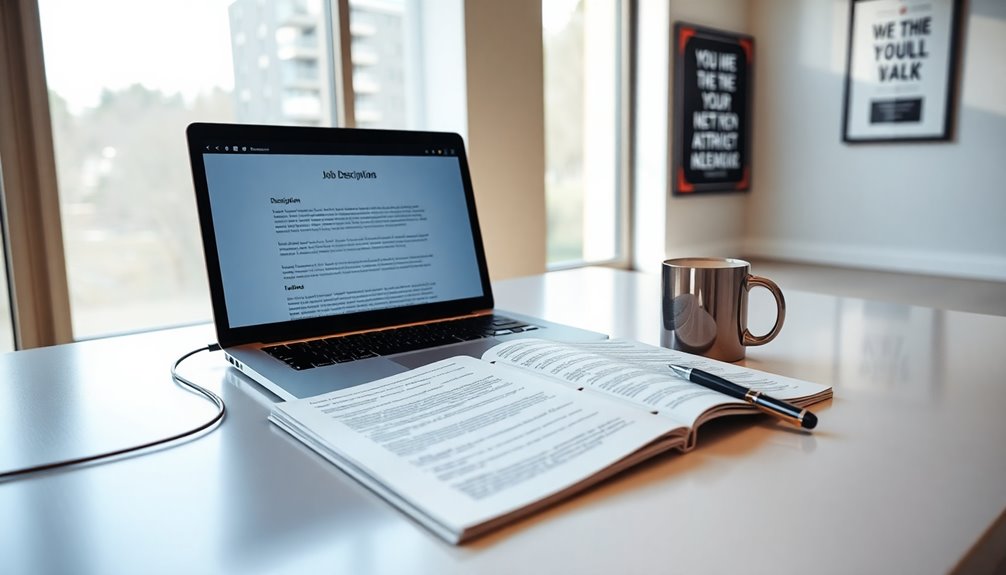Mastering the work experience interview query can truly set you apart. Start by summarizing your relevant education and prior roles, keeping your responses concise and focused. Tailor your examples to directly reflect the job description, emphasizing skills that align with what the employer needs. Use structured methods like the STAR technique to present your accomplishments clearly. Highlight specific challenges you overcame and how those experiences have prepared you for the role. By doing this, you demonstrate not just your qualifications, but also your adaptability and problem-solving skills. Stick around, and you'll uncover even more strategies for success.
Key Takeaways
- Summarize your relevant work history, focusing on experiences that align with the job's responsibilities and qualifications.
- Use the STAR method to structure your responses, detailing specific situations, tasks, actions, and results.
- Highlight problem-solving skills and adaptability by sharing examples of past challenges you've successfully navigated.
- Research the company's culture and goals to demonstrate genuine interest and alignment with their values during your interview.
- Quantify your achievements to provide concrete evidence of your contributions in previous roles, reinforcing your suitability for the position.
Importance of Work Experience

Understanding the importance of work experience in interviews can greatly boost your chances of landing a job. Employers look for candidates who can demonstrate their readiness for job responsibilities by showcasing relevant experiences.
When you summarize your work history effectively, you not only reflect your understanding of what employers expect but also differentiate yourself from others with similar qualifications. Your past roles provide insight into your adaptability and problem-solving skills, which are essential for potential new responsibilities.
Structuring Your Responses

Structuring your responses effectively sets you apart during interviews, showcasing your ability to communicate clearly and confidently. A well-organized answer can help you convey your experiences succinctly and make a lasting impression on your interviewer.
Here are key strategies to contemplate:
- Summarize relevant education and training.
- Highlight qualifications that align with the job responsibilities.
- Prepare concise talking points for clarity.
- Use structured approaches to keep your thoughts organized.
- Reinforce your suitability by referencing resume items.
Additionally, consider drawing on your knowledge of cold medications to illustrate your problem-solving skills when discussing relevant experiences.
Analyzing Job Descriptions

Analyzing job descriptions is essential for tailoring your interview responses effectively. Start by familiarizing yourself with the daily tasks and necessary skills listed. This helps you pinpoint which of your experiences align with what the employer seeks.
Identify the required tools and technologies mentioned; knowing these can set you apart. Outline qualifications to determine which of your past roles to emphasize during the interview. Understanding the company's goals and culture will further enable you to align your responses with their expectations.
Conducting thorough research about the organization also gives you the edge in demonstrating your genuine interest. By following these steps, you can present yourself as the ideal candidate who truly understands the role and its requirements.
Connecting Experience to Role

Connecting your past experiences to the role you're applying for is essential for making a lasting impression during interviews. When you can articulate how your background aligns with the job, you demonstrate not just your qualifications but also your understanding of the position.
Here's how to effectively link your experiences:
- Highlight relevant skills that match the job description.
- Use specific examples to illustrate your accomplishments.
- Show how past challenges have prepared you for this role.
- Discuss tools and processes you're familiar with that the job requires.
- Emphasize your adaptability and problem-solving abilities.
Strategies for Effective Answers

To make a strong impact during interviews, focus on delivering clear and concise answers that resonate with the interviewer. Use active statements and strong verbs to convey your achievements effectively.
Quantify your successes—numbers speak volumes and can illustrate your contributions powerfully. Make sure to connect your past experiences directly to the job responsibilities, emphasizing relevant skills and tools.
The STAR method can help you structure your narratives, ensuring clarity and engagement. Always keep your responses aligned with the job description and the company's goals.
Finally, conclude with a goal statement that outlines how you intend to contribute to the organization, leaving a lasting impression of your readiness and enthusiasm for the role. Additionally, consider the importance of estate planning to ensure that your future contributions align with long-term goals and responsibilities.
Frequently Asked Questions
How Can I Effectively Showcase Volunteer Experience in Interviews?
To effectively showcase your volunteer experience in interviews, start by highlighting the skills and knowledge you gained.
Connect these experiences to the job you're applying for, emphasizing how they align with the role's responsibilities.
Use specific examples to illustrate your contributions, and don't forget to quantify your achievements where possible.
Finally, express your passion for the cause and how it demonstrates your commitment and adaptability, making you a well-rounded candidate.
What if I Lack Direct Work Experience for the Job?
If you lack direct work experience for the job, focus on transferable skills and relevant experiences.
Highlight your education and any volunteer work that showcases your abilities. Use specific examples to demonstrate your adaptability and problem-solving skills.
Research the job description to align your responses with the company's needs. Remember, confidence in your existing skills can make a significant impact, so emphasize how you can contribute positively to the role.
How Do I Handle Gaps in My Employment History?
When handling gaps in your employment history, be honest and proactive. Acknowledge the gap, then focus on what you did during that time—whether it was volunteering, taking courses, or personal projects.
Highlight any skills or experiences gained that relate to the job. Frame the gap as a period of growth and learning.
Show enthusiasm for returning to work and how you're ready to contribute to the team.
Should I Discuss Personal Projects Related to the Role?
Imagine standing before an interviewer, your enthusiasm bubbling over. Yes, you should absolutely discuss personal projects related to the role!
They showcase your passion and initiative, painting a vivid picture of your skills in action. Share how these projects align with the job's requirements and highlight your problem-solving abilities.
It's not just about past jobs; it's about how you've creatively applied your knowledge, making you an even more compelling candidate.
How Can I Prepare for Behavioral Interview Questions?
To prepare for behavioral interview questions, you need to reflect on your past experiences. Identify specific situations where you faced challenges or demonstrated key skills.
Use the STAR method—Situation, Task, Action, Result—to structure your responses. Practice articulating these stories clearly and confidently.
Familiarize yourself with the job description to guarantee your examples align with what the employer seeks. Finally, stay concise, focusing on relevant details that showcase your strengths and adaptability.
Conclusion
In mastering the work experience interview query, you not only showcase your qualifications but also your readiness to tackle new challenges. Remember, "Experience is the best teacher." By structuring your responses effectively, analyzing job descriptions, and connecting your unique experiences to the role, you can create a compelling narrative that captivates employers. With these strategies, you'll present yourself as the ideal candidate, ready to make valuable contributions to their team. Good luck!









